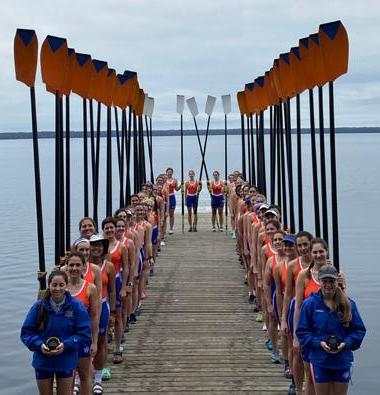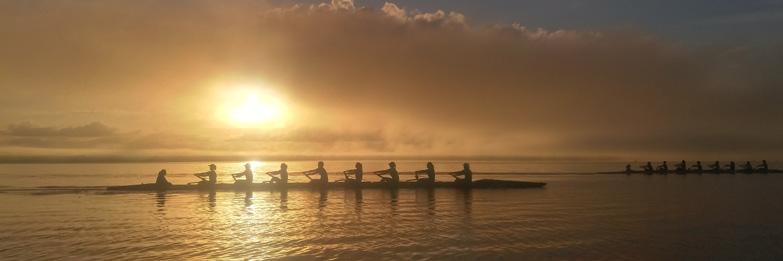
13 minute read
Take the Stairs
How to Motivate From the Inside Out
BY LINDSEY JOHNSON, MS
Why does it seem that some people can get up and run every morning, consistently select the healthier lunch option or create other daily healthy habits, while it’s a struggle for others? The answer all lies in the mindset.
I’ve created my “why” — where do I start?
Intrinsic motivation, or motivation that comes from within instead of an outside influence, is the key to success in most aspects of life. While extrinsic motivation, such as a monetary incentive or winning bragging rights, can be a helpful kickstart to healthy habits, consistency and intrinsic motivation are the key to sustainable change.
How do I create intrinsic motivation? I’m just not feeling it...
Sit down with a pen and paper and contemplate both your “why” and your goals. What is it you ultimately hope to achieve? Are you working to reverse, prevent or delay chronic disease? Are you aiming to have more energy to play soccer in the backyard with the kids or grandkids? Do you want to be at peace to fully enjoy every minute of life? Do you want to be the best version of yourself so you can positively influence the world and the people in it? Once you determine your “why,” this becomes the basis for motivation. To be the best version of yourself, you train your mind, body and spirit to honor yourself and create an environment to have your needs met. You are important, and putting yourself at the top of your priority list helps you take small steps towards your objectives. When you see your mind and body as tools to help you achieve your goals, it’s easier to treat them with love and respect. Small changes such as taking the stairs instead of the elevator, parking further from the entrance to the store, swapping out meat in one meal or taking a few minutes to meditate all become simple ways to honor and respect yourself. By changing your perspective to view healthy habits as stepping stones towards goals versus tasks that you “should” do, the mindset shifts towards yearning to create a healthy environment within your own stratus of influence. When the motivation wanes, revisit your “why” for a boost to get you back on track. Like any behavioral change, starting small and staying consistent are critical to long-term impacts. New habits often take anywhere between 21 to 66 days to become fully integrated into your routine. Once the first small step becomes second nature, you can progress to doing more. For example, to add more bite-sized activity to your day, start with taking the stairs every time you are going to the second floor of a building. Once this becomes an ingrained choice, start choosing the stairs over the elevator when you are ascending three to five floors. If you do this multiple times throughout the day, start with ascending once per day by stairs and gradually increase. Soon these small changes become a routine habit and take you one step closer to optimal health
and wellness. Shifting the mindset towards health and wellness is essential for achieving your life goals. By approaching healthy habits as steps towards improving quality of life, you will reframe your thinking to welcome these habits instead of dreading them. You are important – treat yourself with the kindness and support you give others and allow yourself the opportunity to thrive.
THE MOTIVATION BATTLE
Intrinsic
Motivation that comes from within yourself.
VS
Enjoyment
Interest
Learning
Curiosity
Satisfaction
Extrinsic
Motivation that comes from an outside influence.
Avoiding punishment
Reward or prize
Money
Bragging rights
Praise


To Row Oar Not To Row
PHOTOS COURTESY OF CHRIS TIPPIN
Software engineer Chris Tippin saw a flyer for a new sport his first week of college. Twenty-seven years later, he hasn't walked away from the sport of rowing and his passion is stronger than ever.
How long have you been involved in the sport of crew?
I started rowing at university in the Fall of ‘93. I’ve been involved in crew ever since.
What made you start?
After graduating high school in Virginia Beach, I knew I had to reinvent myself (K-12, all I did was surf). Part of the new me was trying new things in college. In my first week on campus as a freshman, I saw a flyer about tryouts for rowing, an NCAA Division I sport at my university. Walking on to a team sport was something I would have never tried, not to mention having to wear spandex! In the spirit of wanting to change, I had no choice and showed up to the first day of practice knowing nothing about the sport. I didn’t get cut after the first two weeks and here I am, some 27 years later.
What do you love about the sport?
The easy answer is the team. No matter how good you are, you will not be successful if you do not have good teammates to back you up. I enjoy being out on the water for hours at a time. Ultimately, it’s the process I enjoy the most: the day to day grind that you have to do in order to be successful. Raw talent without a work ethic doesn’t get you anywhere in this sport; you have to be willing to work hard day after day, month after month and year after year. I love that!
Share your accolades and any new goals that you would like to accomplish.
TEAM ACCOLADES AND GOALS: The biggest team accolade for UF Crew happened in May 2019, when the women’s crew became Team National Champions. Individual boats have won national titles, an individual set a world record and the team has enjoyed numerous state and regional championships. I am most proud of what the team has accomplished as a group, as a CREW. With regards to future goals for the team, that never changes: continue to build a team that wants to compete on a
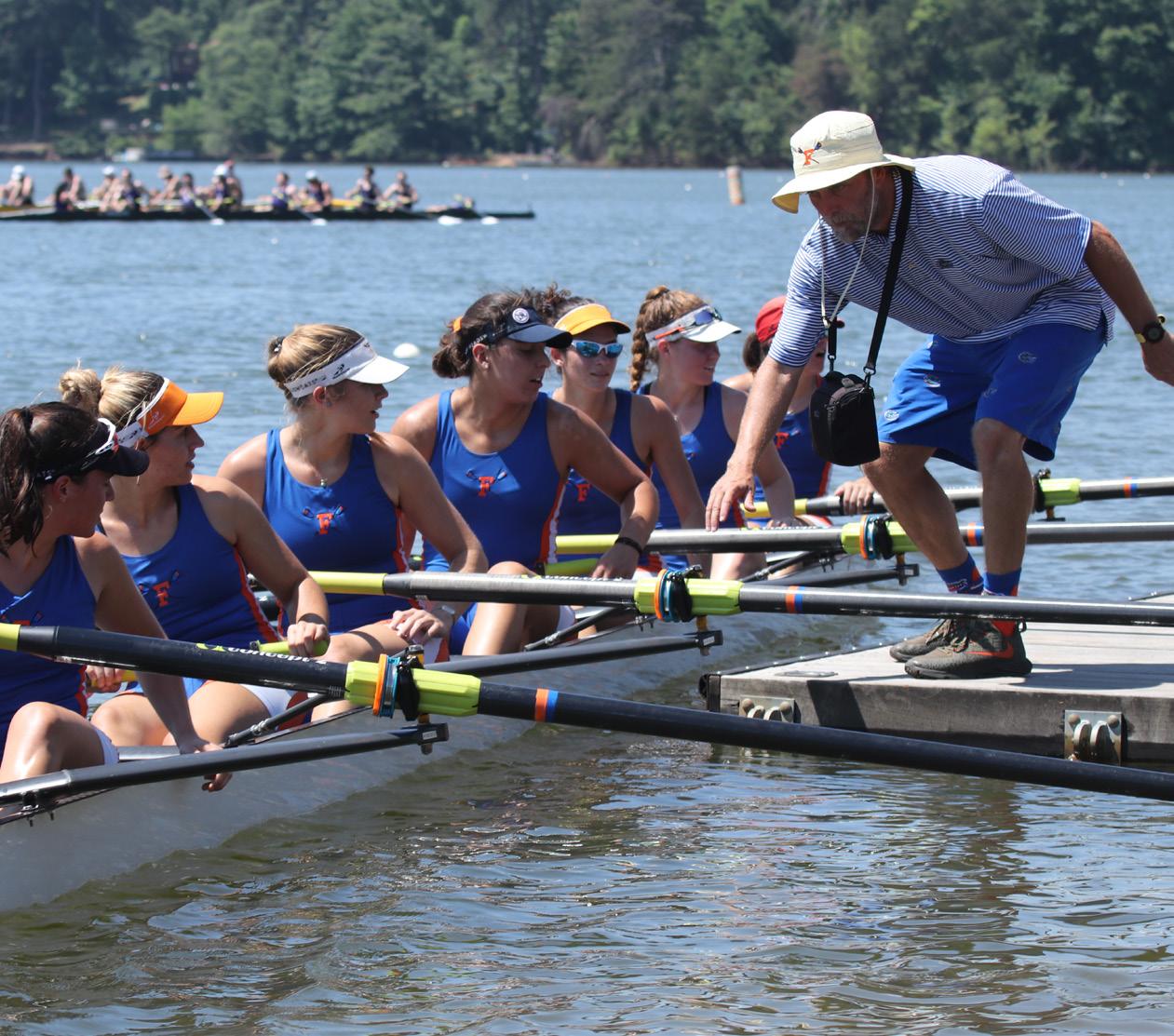
daily basis at practice and regattas. The athletes need to take ownership of the process. If we as a team achieve that simple goal then we will be successful.
PERSONAL ACCOLADES AND GOALS:
For coaching, I was recognized as national coach of the year in 2019 and 2017. I was fortunate to be an official coach at the World Championships when one of my rowers was asked to represent his country of Egypt and I was asked to be his coach at Worlds.
As for my personal athletic career, before college, I was a competitive surfer. In college, I was a two-sports year-long athlete in NCAA DIV I rowing and NCAA DIV I cross country/track. As a rower, my boat finished fourth in the nation, and I competed in England at the prestigious Henley Regatta. In cross country, I qualified for and raced NCAA DIV I .
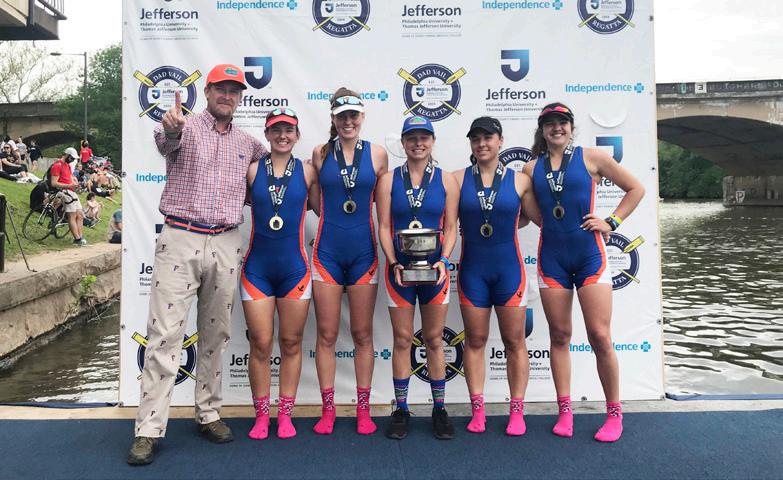
Can you share a little bit about the sport and what people should know about it.
A little known fact about rowing is that it is the oldest collegiate sport in the U.S., with the Harvard/Yale boat race first occurring in 1852. Rowing is one of the original sports in the modern Olympic Games. In 1976, rowing was at the forefront of women’s athletics when the Yale women stood naked in front of their athletic director and read a statement demanding equality with the men’s program. Due to the press, this bold act brought forth a lasting and positive effect to not only women in collegiate sports with the enforcement of Title IX, but to all girls who wanted to participate in sports at any level. It truly is a beautiful sport to be a part of if you enjoy being outside on the water; especially during sunrise or sunset. Just like with golf, technique plays a huge role in determining your success, so rowers work on some part of their rowing stroke on a daily basis. You never get it perfect, but always strive for perfection. Rowing is an expensive sport: the eight-oared shell costs between $35,000- $60,000 or more. Equipment is a very big investment.
When did you begin your coaching career, where are you coaching now and what do you like most about it?
Summer 1999, I got a call from my former coach at my alma mater and he asked if I was interested in coaching. Up to that point, I never even considered coaching and I am pretty sure he only asked because he was desperate to fill the position before the fall semester started and I was local. I accepted his offer and coached an NCAA DIV I team for four years, winning several state and regional titles. I then moved over to coach at a junior program for one year, where the team won the state championship. I took some time off of coaching to begin a family when in 2009, I had an unexpected opportunity to coach at UF – I have been here ever since. I don't plan on going anywhere for many years to come; I truly love this team! The greatest reward comes in the form of the intelligent, athletic, positive and hard-working women I am honored to coach. I feel so lucky to be able to raise my daughter around women like this. I love the process of every year having that feeling of starting over again and building a nationally competitive team. We have a very high retention from year-to-year, but every year is a completely different team dynamic, with new girls coming in and returning girls stepping into leadership roles vacated by graduating seniors. All the while, maintaining the core values of the need to compete on a daily basis being passed down year after year.
What are the greatest challenges when coaching a rowing team?
I think all coaches share the same challenges. The greatest challenge is ensuring your team culture is a positive one, ensuring that the athletes want to compete and give an effort they are proud of on a daily basis. If this challenge is met, the team will be successful. Second, the most important challenge all coaches face is retention from year to year. A coach’s ability to retain their athletes will help elevate it from a team to a program. Just last fall, UF Crew had over 90 women on the team (doing a little too good of a job with retention, in this coach’s opinion). I think all coaches need to constantly remind themselves that the ultimate goal is the experience that the athlete will leave with: was it a positive, will this be something they look back on with fondness? Long after your athletes have left your team, the biggest impression that will be left is the experience on the team with their crew, not of wins and losses. For rowing specifically, there is a balance of how much time is spent on coaching technique and how much time is spent on building fitness/strength. To be successful, you have to have both. You have to find that happy medium. For UF Crew, we are a club team, and that brings its own sets of challenges. As the women’s program has grown in success, I do get more experienced rowers with each successive year. A vast majority of my team are walk-ons just like I was in college with no experience in the sport. Yes, it is a challenge having so many walk-ons, but it is also a positive one. In a sport where technique plays such a huge role, they do not come in with any bad habits that need to be broken. The club team has its own challenges as they are not given the same benefits as an NCAA athlete. As a club team coach, I have to recognize this and be a lot more flexible and understanding. Missing practice for academic reasons is never an issue and does not affect their place on the team. On occasions when an athlete has to miss practice, they understand they need to get the workout done that day on their own. Academics should always come before athletics regardless if you are an NCAA or club athlete.
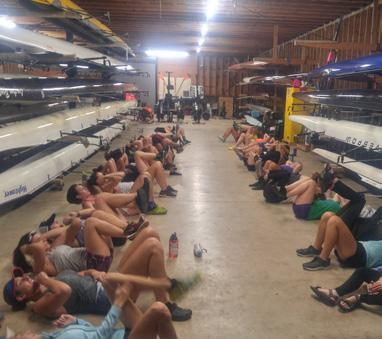
Above: Tippin's UF crew team doing conditioning exercises in the boat house.
Where has been your favorite place to row locally?
Newnans Lake is one of the best places to row anywhere, let alone locally. It is a large body of water so you can get in the meters with little to no recreational boating. Due to the large number of gators on the lake, no one wants to waterski there. Our hulls are only a few inches above the water line so any wake from a motorboat can cause problems. The water conditions on Newnans is superior, as we have many days on the water with barely a ripple on the lake.
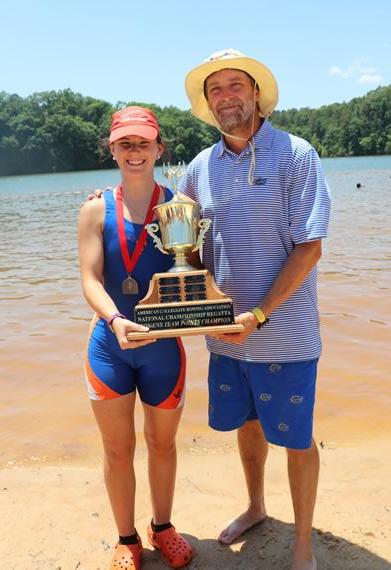
Did you row in college? If so, share your experience.
Yes, I rowed in college for four years and loved it. My teammates became my best friends in college – if we were not at practice together, we were hanging out together. I got to travel, too, and compete in several parts of the U.S. as well as overseas. Perhaps most importantly, I met my future wife while on the team.
What is your best memory as a crew coach?
Extremely hard question to answer; I have seen so many instances of individuals reaching levels of excellence either I or they did not think were possible. If I had to pick one, it would be at nationals last year where we became team national champs. We entered several boat classes from a single with one rower all the way up to the eight-oared shell that has eight rowers and a coxswain. One of the boat classes we entered is called the pair that has only two rowers. The pair is considered the most difficult boat to row well and requires months and months of practice with the same partner. Our pair only had three weeks to practice together leading into nationals, so we went into the race with no real expectations. It is very rare nowadays when I get emotional at a race, but when I saw those two women in the pair do well enough in their semifinal race to qualify for the grand finals at nationals, I got emotional. I was so proud of those two! That weekend was truly a team effort with several boats not only making grand finals at nationals but also medaling.
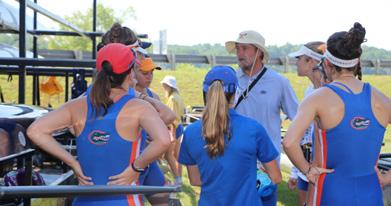
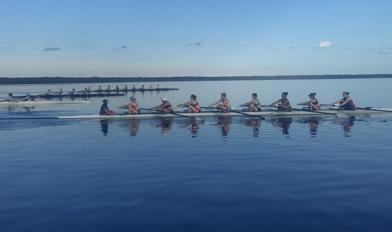
OPEN TO ALL
If anyone in Gainesville or the surrounding area is interested in trying rowing, you do not have to be in college to get involved. There is a local rowing team, Gainesville Area Rowing (GAR) that caters to junior and master rowers regardless of experience. GAR is led by coach Hugo Moon, whom I respect a great deal. You can get more information about them at
gainesvillearearowing.com
